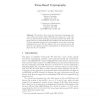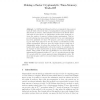167
click to vote
CRYPTO
2003
Springer
15 years 7 months ago
2003
Springer
We consider the problem of constructing randomness extractors that are locally computable; that is, read only a small number of bits from their input. As recently shown by Lu (thi...
104
click to vote
CRYPTO
2003
Springer
15 years 7 months ago
2003
Springer
We introduce the concept of torus-based cryptography, give a new public key system called CEILIDH, and compare it to other discrete log based systems including Lucas-based systems ...
115
click to vote
CRYPTO
2003
Springer
15 years 7 months ago
2003
Springer
We revisit the definitions of zero-knowledge in the Common Reference String (CRS) model and the Random Oracle (RO) model. We argue that even though these definitions syntacticall...
CRYPTO
2003
Springer
15 years 7 months ago
2003
Springer
119
click to vote
CRYPTO
2003
Springer
15 years 7 months ago
2003
Springer
We deal with computational assumptions needed in order to design secure cryptographic schemes. We suggest a classi£cation of such assumptions based on the complexity of falsifying...
124
click to vote
CRYPTO
2003
Springer
15 years 7 months ago
2003
Springer
We consider the fundamental problem of authenticated group key exchange among n parties within a larger and insecure public network. A number of solutions to this problem have bee...
111
click to vote
CRYPTO
2003
Springer
15 years 7 months ago
2003
Springer
Can you guarantee secrecy even if an adversary can eavesdrop on your brain? We consider the problem of protecting privacy in circuits, when faced with an adversary that can access ...
129
click to vote
CRYPTO
2003
Springer
15 years 7 months ago
2003
Springer
Abstract. A significant effort has recently been made to rigorously relate the formal treatment of cryptography with the computational one. A first substantial step in this dire...
107
click to vote
CRYPTO
2003
Springer
15 years 7 months ago
2003
Springer
Abstract. In this paper, we reconsider the notion of plaintext awareness. We present a new model for plaintext-aware encryption that is both natural and useful. We achieve plaintex...
121
click to vote
CRYPTO
2003
Springer
15 years 7 months ago
2003
Springer
We describe a block-cipher mode of operation, CMC, that turns an n-bit block cipher into a tweakable enciphering scheme that acts on strings of mn bits, where m ≥ 2. When the und...


